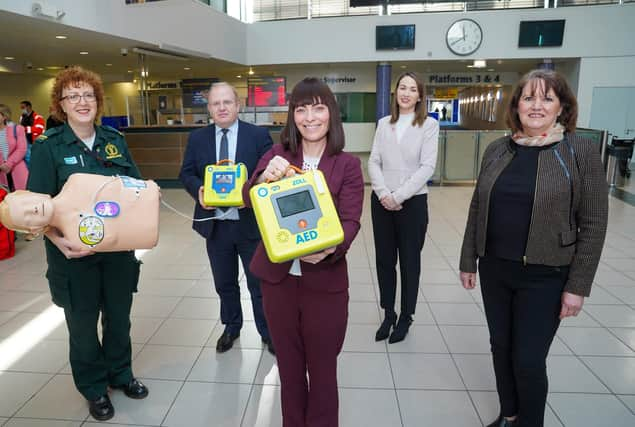Defibrillator roll-out in bus and train stations launched today


The scheme, funded by the Department for Infrastructure, is being delivered in partnership with the British Heart Foundation Northern Ireland (BHF NI) and the NI Ambulance service (NIAS).
In total, 134 units will be installed at over 80 locations including most bus and train stations. These publicly accessible kits will play a vital service in helping to save lives when people suffer a cardiac arrest, which can happen to anyone. Details of their location and hours when they are accessible will also be added to The Circuit – The National Defibrillator Network - a database which connects defibrillators to NHS ambulance services across the UK, so that in those crucial moments when someone is having a cardiac arrest, they can be accessed quickly to help more people survive.
Advertisement
Hide AdAdvertisement
Hide AdSpeaking today at Lanyon Place Station as one of the first defibrillators was unveiled, Infrastructure Minister Nichola Mallon said, “Across the north in a typical year over 1,400 people suffer an out-of-hospital cardiac arrest and sadly fewer than 10% of these people survive.
“We know that swift use of CPR and, if possible, a defibrillator has a major impact on survival rates. I am committed to ensuring that this life-saving equipment will be available at our bus and rail stations and was pleased to allocate funding of £635,000 to deliver this.
“I am delighted to be at Lanyon Place Station today as we start the roll-out of the 134 defibrillator units across the network and I want to thank the British Heart Foundation and the Northern Ireland Ambulance Service for their vital support in delivering this hugely important scheme.”
John Glass, Translink Director of Infrastructure and Projects said, “This is great news for our passengers, staff and people who live near our facilities. Our stations are a key part of the communities we serve and as we start to see more and more people come back to public transport these valuable kits will make journeys even safer.
Advertisement
Hide AdAdvertisement
Hide Ad“Publicly accessible to everyone, each defibrillator is accompanied by step-by-step spoken instructions which are built into the unit and explain how to use it on someone in an emergency.
“We are grateful to the Minister for the essential funding and proud to be teaming up with BHF NI and NIAS to deliver this defibrillator programme adding to the growing number of kits around NI helping to save lives when every second counts.”
Denise McAnena from British Heart Foundation NI said, “Every second counts when someone has a cardiac arrest and, alongside CPR, prompt use of a defibrillator is critical in giving them the best chance of survival. To put it simply, having a defibrillator nearby and knowing where it is could be the difference between life and death.
“We are proud to be supporting Translink on this important work. By registering their defibrillators on The Circuit, Translink will be ensuring more defibrillators can be accessed in a life threatening emergency and will help improve survival rates of out of hospital cardiac arrests across Northern Ireland.”
Advertisement
Hide AdAdvertisement
Hide AdLynda Donaldson (61) from Lisburn suffered a cardiac arrest on a busy Saintfield street back in 2011. It was thanks to bystanders who quickly began CPR and brought a nearby defibrillator that she survived. She said, “I was walking down the street with my partner Graham and suddenly felt dizzy. I went to put my hand out to Graham to say ‘I don’t feel well’ but I didn’t even get the words out, in two seconds I dropped. My heart had gone into cardiac arrest, no pain, no warning, just a couple of seconds of dizziness and down.
“Little did I know bystanders had started CPR and were able to get a defibrillator. It was these quick actions that saved my life. I am forever grateful to those who helped me that day. I know more than most how important these lifesaving devices are and I am delighted Translink is leading the way in making more defibrillators accessible.”
Stephanie Leckey, Community Resuscitation Lead at Northern Ireland Ambulance Service said, “NIAS welcomes and appreciates the Translink initiative which will see defibrillators available in all of their locations, both urban and rural. Cardiac arrest does not discriminate and can happen at any time in any location. Having defibrillators available strengthens the chain of survival, and along with CPR will undoubtedly affect the outcome and ultimate survival of those who may need it. Registration of the defibrillator will ensure that NIAS Control staff can direct a bystander to the closest defibrillator while CPR is ongoing.”